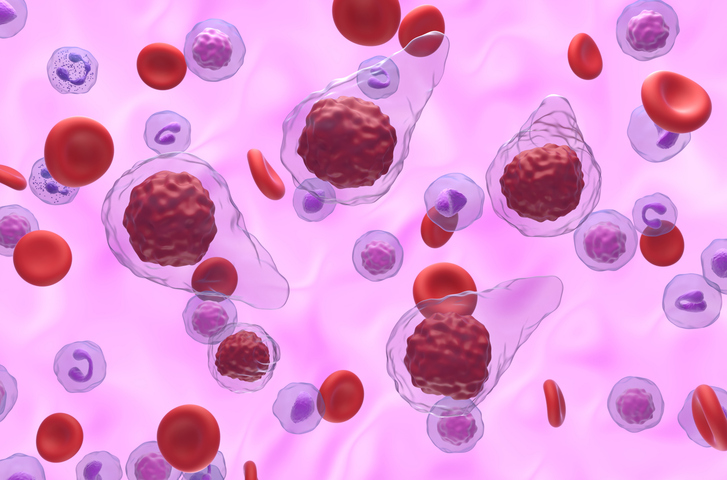
Pelabresib plus ruxolitinib was “well tolerated” and showed “durable improvements in spleen and symptom burden” in patients with myelofibrosis who were naïve to Janus kinase (JAK) inhibitor therapy, according to results from the phase II MANIFEST trial.
John Mascarenhas, MD, of the Tisch Cancer Institute at the Icahn School of Medicine at Mount Sinai, and colleagues conducted the research and published its results in the Journal of Clinical Oncology.
Dr. Mascarenhas and colleagues conducted the research because JAK inhibitors are “standard therapy” for patients with myelofibrosis, but “spleen response rates of 30%-40%, high discontinuation rates, and a lack of disease modification highlight an unmet need.”
Pelabresib, also known as CPI-0610, is an investigational, selective, oral bromodomain, and extraterminal domain inhibitor. Ruxolitinib is a JAK1/JAK2 inhibitor.
Dr. Mascarenhas and colleagues tested the combination in a cohort of patients from the open-label, nonrandomized MANIFEST trial. The patients in the cohort had myelofibrosis and were naïve to JAK inhibitor therapy. The study’s primary endpoint was a reduction in spleen volume reduction of ≥35% at 24 weeks.
The cohort included 84 patients who received at least one dose of pelabresib and ruxolitinib. The median patient age was 68 years. Most patients (61%) were intermediate 2 risk per the Dynamic International Prognostic Scoring System, while 24% were intermediate 1 risk, and 16% were considered high risk. Most patients (66%) had a hemoglobin level of <10 g/dL at baseline.
A reduction in spleen volume reduction of ≥35% at 24 weeks occurred in 68% of patients, with 56% achieving a total symptom score reduction of ≥50% at that time point. Also at week 24, 36% of patients had “improved hemoglobin levels,” while 28% had a fibrosis improvement of at least one grade. Furthermore, 29.5% had >25% reduction in JAK2V617F-mutant allele fraction, which was associated with a reduction in spleen volume reduction of ≥35% (P=.018, Fisher’s exact test).
At 48 weeks, 60% of patients had a reduction in spleen volume reduction of ≥35%.
Grade 3 or grade 4 anemia occurred in 35% of patients, while thrombocytopenia occurred in 12% of patients. Nearly all (95%) patients continued combination therapy beyond 24 weeks.
“The rational combination of the [bromodomain and extraterminal domain inhibitor] pelabresib and ruxolitinib in JAK [inhibitor]-naïve patients with myelofibrosis was well tolerated and showed durable improvements in spleen and symptom burden, with associated biomarker findings of potential disease-modifying activity,” Dr. Mascarenhas and colleagues concluded.
Reference
Mascarenhas J, Kremyanskaya M, Patriarca A, et al. MANIFEST: pelabresib in combination with ruxolitinib for Janus kinase inhibitor treatment-naïve myelofibrosis. J Clin Oncol. 2023. doi:10.1200/JCO.22.01972






 © 2025 Mashup Media, LLC, a Formedics Property. All Rights Reserved.
© 2025 Mashup Media, LLC, a Formedics Property. All Rights Reserved.